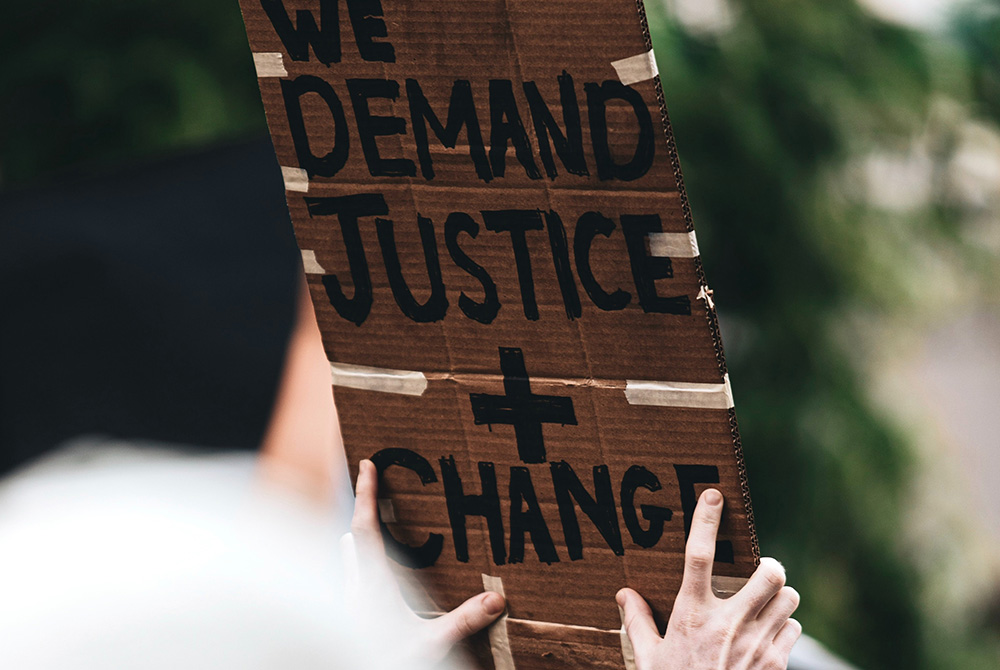
(Unsplash/Logan Weaver)
Life, wherever and however lived, is governed and conditioned by laws and traditions that people have created. Embedded in these laws and traditions are various cultural and religious attitudes, mindsets, and political and social norms deemed acceptable by a majority of people but which oftentimes have oppressed and underrepresented those who choose or are forced to live on the margins.
Laws and traditions can be beneficial to maintaining a sense of order. They preserve legacies and "the way things have always been" or "have always been done." Laws and traditions that remain frozen in time, however, can stifle the work of change, diversification, inclusion, creativity and transformation that human communities and institutions need if they are to be dynamic entities in and for the 21st century.
With governments and their laws in turmoil, with dead or dying traditions being clung to or resuscitated by stale breath, these two questions come to the fore: Whom do the laws benefit and protect? What traditions are held on to, pined for, kept etched in stone so that power is preserved, patriarchy and hegemony remain in place, and comfort zones are soothed without anyone ever having to deal with or be challenged by the Spirit? The Spirit is constantly doing something new, if we can perceive it, if we can trust it, if we can move with it, radically letting go of the past, the known, the secure, the "defined," the legacy of what was. This Sunday's readings invite us to think deeply about "law" and "tradition."
The first reading from Deuteronomy associates law with life. Keeping Torah is not about self-preservation or self-perfection. Keeping Torah is the way to establishing and safeguarding right relationship with the divine, with one's self, and with one's neighbor, inclusive of human and nonhuman life. Even the land and the animals enjoyed sabbath rest afforded to humans. Keeping Torah also means justice for the disenfranchised, the poor, the widow, the orphan, the sojourner, the stranger and, in today's world, the undocumented immigrant migrating from political and social oppression, not to mention the climate migrants, the likes of which we have yet to experience profoundly as lands become uninhabitable.
Advertisement
A great nation composed of truly wise and intelligent people has statutes and decrees that are just. When we read and study the laws and decrees found in Exodus through Deuteronomy, we discover that some laws and decrees are gendered, biased, hegemonic and oppressive. Other laws are life-sustaining for all communities of life. The heart and foundation of the law is love which leads to ethical praxis and justice for all (see Deuteronomy 6:1-9; 10:12-22; Jeremiah 31:31-34; Micah 6:6-8). What new laws are being crafted and implemented locally, nationally, globally, that continue the systemic patterns and forces of discrimination and marginalization?
Today's responsorial Psalm is a reminder that the one who does justice will live in the presence of the divine. From the perspective of embodied spirituality, I add that the one who lives in the presence of the divine is the one who lives a life of justice. What, however, is understood by love and justice? What has been our encounter with the divine whose Spirit working through the created world has moved mountains for us when we have been treated unjustly? An encounter with the divine leads to a profound understanding of love and an unquenchable passion and thirst for justice that will make us doers of the word and not just hearers of it.
Today's Gospel picks up threads of the first reading. Clearly the description of the disciples indicates that these characters did not keep the human-made religious purity laws. The washing of the hands and vessels before using them were acts of ritual purification that signaled a desire to consecrate the most basic of human activities. Free-spirited, they know the heart of the matter, and they live their life accordingly. They do not keep nor follow the tradition of the elders either. When laws and traditions become ends unto themselves, when they become "doctrine" used to sustain tombs and mausoleums built with old bricks and mortar reflective of times past, then the Spirit will have difficulty in trying to renew the face of the earth.
Ponder this reality: only when animals shed their "coats" and birds molt and lose their dead feathers can new fur, new skins, new feathers emerge. In this present-day world, the cry for justice is deafening. The need for new structures, new interpretations of cherished understandings, and new ways of thinking is palpable. What are we willing to shed, change and let go of in order to embrace right relationship, to live from the heart, to set free the transformative Spirit so it can run wild in our lives and in our world, grounding us in the present, not the past, with hope for the future?








